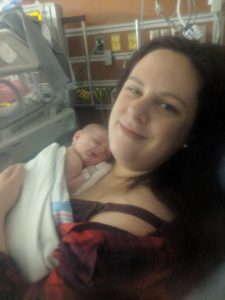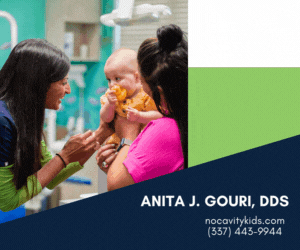When I had dreamed of having my baby, I imagined covered in absolute bliss, like the fluffiest sherpa blanket. After experiencing skin-to-skin and the first motherly act of breastfeeding, there would be an instant bond, and it would be quickly documented as one of the best experiences of my life.
Reality wasn’t what I dreamed of at all.
I had just survived labor and delivery. It had been a stressful few days with my doctor claiming I would most likely have to have a C section since I was overdue and would need to be induced. We were both surprised when the induction actually took, and I was in active labor. The first string of anxiety plucked like a guitar string in my heart when my doctor broke my water. In my drugged state I heard her say, “Meconium.” My ears perked up because of course I had googled and researched everything that could possibly go wrong in labor ranging from stillbirth to umbilical cord strangulations. I knew what meconium was. It was essentially poop my baby expelled in utero, which happens to older babies and why prolonging childbirth past 42 weeks is dangerous. I had gone over by 41 weeks, which is why I was being induced. But I had to give her time to come on her own – all the baby books said so. Why is there meconium?
Something was wrong.
At my incredibly anxious face, my doctor reassured me that there was nothing to worry about. This was common, natural even. Everything else looked great. And just look – she swore she was going to have to perform surgery on me and here I was – beating the odds and surprising my very experienced doctor we could attempt this naturally.
I took a breath and settled. Everything was going to be fine. I was going to be fine.
Strangely, labor was a breeze. Well, you know, after the epidural. I had prepared myself for this moment. I have dreamed of this moment. This unmotherly thirty-year-old was ready to experience the first moments of motherhood bliss I have heard so much about it. To make the moment even more suspenseful, my husband and I chose to not know what sex our baby was until birth. My husband in a choked-up voice, tears streaming down, told me I gave him a daughter.
I was in utter shock, but then started to take notice of the peculiarities. My doctor telling my husband he couldn’t cut the cord because there wasn’t enough time. A team of nurses in the back corner waiting to check and doctor her. As she slipped from my birth canal, I didn’t hear her crying. I didn’t hear anything.
Something was wrong.
I put on a brave face while doctors and nurses congratulated me. My husband holding my hand, talking with apparent joy in voice. Why wasn’t my baby in my arms? Why weren’t we doing skin to skin? Why wasn’t I attempting our first nursing session? This wasn’t right – they weren’t doing this right.
The seconds seemed to burn in the air, twisting into what felt like hours. She wasn’t screaming. Babies were supposed to scream. Right? Giving her another minute, and another. Besides for a few split-second strangled cries, I couldn’t hear anything from her corner of the room. I prayed that I would hear her cry.
After an eternity, a nurse came over to me and said something about her not breathing on her own. They had to take her immediately to the neonatal intensive care unit and would be back soon with an update. They could let me hold her for a second, but only a second for a picture. I held a very still, small baby and looked at her for the first time. I couldn’t even marvel at her preciousness before she was swiftly taken away my arms, and away from the room.
I didn’t understand the words the nurse said. I felt numb. Both our families eagerly awaited in the waiting room, especially on edge with the news of the gender. I didn’t want to see them. They were here to see a baby, a baby who wasn’t here. As my luck would have it, my delivery coincided with the two hours NICU shut down for evening visiting hours. Instead of spending the first few hours of her life together, I wore plastic smiles as our families were ushered in our hospital room. We had to deliver the news that we had a daughter, but with nothing to show for it.
When finally – FINALLY – I was able to visit the NICU. I was still numb. I hadn’t shed one tear. It was there though, where I would learn things a NICU parent would never forget.
There was the hand-washing station. If anything, it prepares you for COVID-19. I stood there for 90 seconds washing my hands. Yes, there was a timer. You washed in between your fingers and around your wrists, and even clean out your fingernails. Also, this is where you dumped your phone in a plastic baggy to avoid picking up any remnant germs.
And oh the beeping. The NICU parent never forgets the beeping. For those who have never been inside a NICU, there are constant alarms to monitor heartbeats and blood pressure, and oxygen rates. These will go off at multiple times, almost creating a lullaby of alarms – if alarms can be considered peaceful.
My first night I visited I was explicitly told I could not hold her, I could graze her hand, which was just as well, since she laid in almost an enclosed plastic box. I would find out that in addition to meconium and her breathing troubles, she was considered to have a low gestational weight at 6 pounds, 6 ounces. At 41 weeks they expected a much bigger baby. She also couldn’t hold her body temperature, which is why she had to be so enclosed. My poor little girl couldn’t have the luxury of drinking by bottle, and instead had an IV to supply fluids. It was an out of body experience. Was this my child? I had a baby? This was really her? I looked around the room, seeing tiny, tiny babies, barely making it to 6, 7, 8 months of pregnancy hospitalized. I was late at 41 weeks. She was fully grown. NICUs were for premies. Not fully grown babies.
I left the NICU that night to go to a lonely room, with me in a hospital bed, and my husband on a pull out couch. The baby bed very noticeably vacant.
I remember clearly when my doctor arrived the next morning asking where the baby was. I also clearly remember when she told me and my husband to expect intense emotion due to my hormones suffering great increases and decreased due to childbirth. I inwardly rolled my eyes thinking I would be fine, I felt fine.
In the next six weeks, I would cry more than I have cried in the last six years of my life.
It didn’t hit me until that second night. I had brought all these newborn onesies. I had brought pacifiers and caps and mittens. There was nipple cream and nipple shields – I wouldn’t get to use them, any of them. I had prepared for this moment for months and my baby wasn’t here. I was missing out completely on everything a newborn mom was supposed to experience.
I was pretty inconsolable after that. It didn’t help that I found out from a nurse family member that the doctor had confided they were expecting my daughter to need to stay a week. The thought of getting into our car, with the empty baby seat in the back seat, poised, ready to hold her was heart-stopping. A punch to my gut and my lungs stopped working.
 When I finally was able to hold her in the NICU, it was incredibly joyful, but there was so much heartbreak too. She didn’t feel like my child. She had so many wires and tubes connected to her. This had to be so painful! I tried to breastfeed. Was this really my child?
When I finally was able to hold her in the NICU, it was incredibly joyful, but there was so much heartbreak too. She didn’t feel like my child. She had so many wires and tubes connected to her. This had to be so painful! I tried to breastfeed. Was this really my child?
I went to bed crying myself to sleep.
The rest of the hospital stay was constantly going in and out at the NICU. Having to obey their many “no visitor” hours it seemed – truthfully it was only 4 hours each day. But it felt never-ending. Surprisingly to everyone, my daughter improved significantly, needing only 4 days of the NICU. She even got to sleep in our room the third night, still connected to her wires and alarms. Every time her heart rate fell to below 100 BPM, an alarm would sound. Which literally happened almost every five minutes. Needless to say, my husband and I didn’t sleep and I had to convince him not to throw the device out of the window.
Taking her home was a happy affair, but the pain and sadness remained. Breastfeeding was a bust since she became spoiled to the bottle in the NICU. This seemed like another mistake where I missed out on bonding and providing for her. I still felt so disconnected to her and continued to mourn our missed precious moments. I started to wonder if I was broken and faulty. Everyone speaks of the instant bond. I didn’t have mine – why did things have to be this way? Why did she have to go to NICU? She was full grown! I knew she was all better now and completely healthy and I just should be grateful dammit. But I still mourned. How could I be mourning for a baby that was in my arms?
It wasn’t until I visited a friend group of moms for the first time since birth, and I revealed my birth story. After dinner, one of the moms who too had a NICU baby pulled me back and said with the strongest conviction in her voice,
“Everything you’re feeling is valid. Having your baby taken away from you after birth is one of the most unnatural things to happen in the world. You’re supposed to be with them from the beginning.”
Tears sprung to my eyes at this acknowledgment. Understanding and acceptance dawned on me. I was too busy berating myself for missing the moments of a newborn when she had a relatively short stay. As Brené Brown would say, I was engaging in comparative suffering. “I don’t have a right to be sad. Some babies are in the NICU for months. Your baby is fine and healthy. Stop crying, get yourself together. Stop feeling sorry for yourself.”
At the moment, I was given permission to give myself grace. And to say, it was valid. I should have had my baby the whole hospital stay. I missed out.
Once I gave myself that freedom to experience my emotions, I was able to accept our journey and grow. Not long after, I finally felt that mother glow of bonding, where I was rocking her to sleep and my heart about to burst from the consuming love I have for her.
If there is any insight that I can give to any readers who find themselves in this situation, either personally or someone you love, give grace. Ask them how they are doing. Tell them it is okay to cry. But keep checking in and keep validating them. It is not a natural experience and while they will make it through – both mom and baby – they need the space to process these sometimes-negative emotions. I am forever thankful for those who did that for me.


















